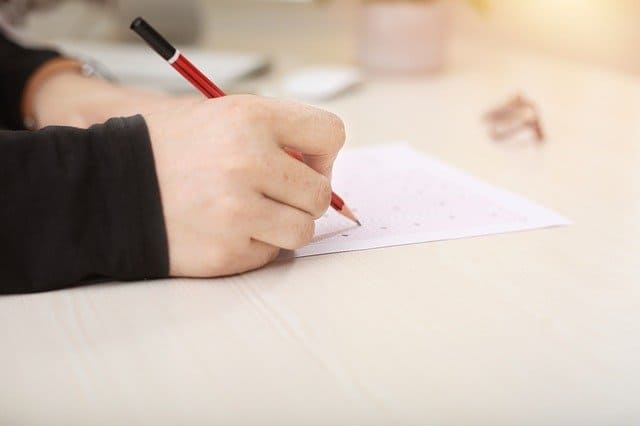
The Office of Qualifications and Examinations Regulation (Ofqual) has today (February 25) published documents outlining how qualification grades will be assessed this year.
GCSEs, AS and A levels
For GCSEs, AS and A levels, teachers will assess the standard at which a student is performing based only on what they have been taught so that a pupil’s school or college can determine their grade. Teachers’ judgements will be based on a range of evidence relating to the subject content teachers have delivered, either in the classroom or via remote learning.
Teachers will use evidence about students’ performance gathered throughout their course to inform judgement. This might include work already completed, mock exam results, homework or in-class tests. Teachers may also use questions from exam boards, largely based on past papers, to help assess students, but this won’t be compulsory. Reasonable adjustments should be taken into account for students living with disability.
The arrangements for this year are designed so that teaching and learning can continue for as long as possible. Teachers will make judgement of work as late in the academic year as is practical.
Teachers will tell students which pieces of work will count towards their grade, before the grade is submitted to the exam board.
Non-exam assessment (NEA) work or coursework, including for Project qualifications, will be marked by teachers and will contribute to an overall grade, whether or not it has been completed. Advanced Extension Awards and Project qualifications will be treated in the same way as GCSEs, AS and A levels.
For GCSE, AS and A level art and design, a grade will be based on a student’s portfolio only, whether or not it is finished. For GCSE English language, GCSE modern foreign languages and A level sciences (biology, chemistry, physics and geology), a student’s school or college should submit a separate grade or result for the spoken language or practical skills tested, based on work completed.
Support materials
Exam boards will provide a package of support materials to schools, colleges and other exam centres, including questions and mark schemes. They will also give teachers advice about choosing topics, marking, and making grading judgements. Wherever possible, the exam boards will base this material on questions that have appeared in past exam papers.
Quality assurance
Exam boards will put in place quality assurance arrangements to make sure consistent judgements are being made and a head teacher or principal will sign off all grades.
Results
The aim is to give results for AS and A levels on 10 August, and GCSEs on 12 August. Results for vocational or technical qualifications linked to moving on to further or higher education should also be issued to students either on or before these dates.
Appeals
A student unhappy with their grade would submit an appeal to the school or college, so that they could check whether an administrative error had been made. If a centre does find an error in the grade submitted, it can submit a revised grade for the board to consider. If a centre does not believe an error had been made, the centre will appeal to the exam board on the student’s behalf, and will be supported to do so.
Vocational and technical qualifications (VTQ) students will be able to appeal on the same basis
Vocational and technical qualifications
Millions of vocational and technical qualifications (VTQs) are awarded to learners each year. These include short qualifications, such as functional skills qualifications, and longer courses such as BTECs.
Around 5,000 of these, representing a diverse range of qualifications, will need different arrangements this year so that they can be awarded. These range from entry level qualifications up to level 6 (broadly equivalent to degree level).
The way that VTQs will be awarded in 2021 allows for the challenges that are unique to this year.
As last year, for many qualifications, teacher judgement will play a central role – more so in some qualifications than others. Some exams and assessments, however, will still go ahead this year either remotely, or in person where it is safe to do so.
Applied generals, including BTECs
If studying for a qualification that is similar to, or taken alongside GCSEs or A levels, a student will be eligible for a teacher assessed grade. This will require the teacher or lecturer to make an informed judgement on the grade using a variety of evidence, such as performance of tasks or assessments that have already been completed.
Examples of these types of qualifications are BTECs (Pearson) and OCR Cambridge Technicals in subjects such as engineering, digital media and health and social care. They also include Pre-U and core maths.
International Baccalaureate exams have been cancelled for the UK and more about how they will be awarded will be announced after a short technical consultation, which should conclude by mid-March.
Functional skills, English for Speakers of Other Languages (ESOL) Skills for Life
A student working towards a qualification in Functional Skills, for example, in order to complete an apprenticeship, should still be able to take assessment, in line with public health measures. Teacher assessed grades will be used where a student cannot access an in-person or remote assessment.
Professional or occupational qualifications
A qualification that requires a demonstration of professional competence will need to be assessed on practical skills.
Assessments for these types of qualifications should be continuing throughout 2021, using social distancing or remote assessment, for example.
Examples of these types of qualification are: plumbing, hairdressing, electrics, construction and veterinary work.

